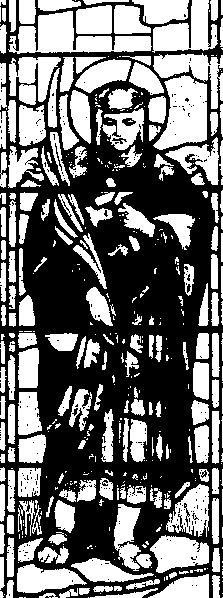Cynog ap Brychan facts for kids
Quick facts for kids Saint Cynog or Canog of Wales |
|
|---|---|
| Born | c. 434 AD Wales |
| Died | 5th century AD |
| Venerated in | Catholic Church |
| Feast | 7 October |
| Attributes | A young man with gingery hair, a Celtic tonsure and a torc holding a palm |
| Patronage | Kilmacanogue, County Wicklow |
Saint Cynog, also known as Canog, was an important early Welsh saint. He was born around 434 AD. Cynog is remembered as a martyr, someone who died for their beliefs. His special holy place, called a shrine, is in Merthyr Cynog, Wales. People celebrate his feast day on October 7th or 9th. In Ireland, he is known as St. Mocheanog.
Contents
Who Was Saint Cynog?
Cynog was said to be the son of Brychan, a powerful Welsh prince. This was during a time in British history known as the Dark Ages. As a young man, Cynog loved to hunt.
He later became a hermit priest. A hermit is someone who lives alone for religious reasons. He also traveled as a missionary. This means he helped spread Christian teachings. He founded churches in Wales, Ireland, and Brittany. Eventually, he returned to Wales to live as a hermit again.
Saint Cynog's Deeds
Stories say that Saint Cynog used his prayers to help people. He is believed to have driven away a group of giant creatures. These creatures, called ormests, terrorized a community in the mountains of Wales.
Cynog was also known for being cheerful. He was happy to do even the simplest tasks. However, some other monks became jealous of his holiness. They were also annoyed when he told them to stop being lazy.
Sadly, Saint Cynog was murdered on a mountain called the Van. This mountain is part of the Bannau Brycheiniog area. He was living with other hermits who became jealous of him. They also resented his advice against their laziness. Because he died for his beliefs, he was seen as a martyr. His holy remains, called relics, are kept at Merthyr Cynog.
The Torc Relic
In 1188, a writer named Gerald of Wales wrote about a special item. He said there was a torc that Cynog once wore. A torc is a large, stiff neck ring, often made of metal. This one was believed to be a royal item. Gerald saw this torc while traveling through an area called Brycheiniog.
Experts believe this torc was made in Wales or Ireland. It likely dates back to the Viking period, around the 10th or 11th century.
Where Saint Cynog is Honored
Saint Cynog is mostly honored in Brycheiniog. Many places there are named after him. These include Defynnog, Ystradgynlais, Penderyn, Battle, Llangynog, and Merthyr Cynog. Merthyr Cynog is believed to be where he was buried.
Saint Cynog in Ireland
Saint Cynog is thought to have spent time in Ireland. There, he was known as Mochonog or Mocheanog. This name means 'my young Canoc'. He started an old church in Kilmacanogue, County Wicklow.
Some stories say he was a student of Saint Patrick. They even claim he baptized the children of Lir, a famous Irish legend. A school in Bray, Ireland, is named in his honor. Tradition also says his brother was Saint Mochorog. Mochorog also worked in Wicklow and founded churches there.
 | Janet Taylor Pickett |
 | Synthia Saint James |
 | Howardena Pindell |
 | Faith Ringgold |


